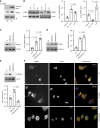GPR81 nuclear transportation is critical for cancer growth and progression in lung and other solid cancers
- PMID: 40901330
- PMCID: PMC12400187
- DOI: 10.5306/wjco.v16.i8.107208
GPR81 nuclear transportation is critical for cancer growth and progression in lung and other solid cancers
Abstract
Background: The Warburg effect is common in cancers. Lactate and its receptor GPR81 play an important role in cancer progression. It is widely accepted that membrane receptor nuclear translocation plays some novel role in cancer pathology. The mechanism by which the lactate/GPR81 axis regulates cancer malignancy remains unclear.
Aim: To elucidate the mechanism of GPR81 nuclear transportation promoted by exogenous lactate.
Methods: Lung cancer cells were stimulated with exogenous lactate and GPR81 levels were measured by immunofluoresence and western blot analysis in membrane, cytoplasmic, and nuclear fractions. Lung cancer cells were transduced with a mutant GPR81 nuclear localization signal (NLS) construct, wild type GPR81 or empty vector and used to examine how GPR81 nuclear transportation affects lung cancer cells malignancy in vitro and in vivo. Immunoprecipitation Proteomics analysis and Chromatin immunoprecipitation (ChIP) sequencing were used to determine GPR81 interacting proteins and genes.
Results: In response to hypoxia/Lactate stimulation, GPR81 translocates and accumulates in the nucleus of lung cancer cells. Functionally, GPR81 nuclear translocation promotes cancer cell proliferation and motility. Depletion of the GPR81 NLS depletes GPR81 nuclear levels and decreases cancer cell growth and invasion in vitro, as well as cancer cell malignancy in vivo. Proteomics analysis revealed a set of proteins including SFPQ, that interact with GPR81 in the cancer cell nucleus. Notably, the interaction of GPR81 with SFPQ promotes cancer cell growth and motility. ChIP sequencing analysis discovered that there is a set of genes targeted by GPR81.
Conclusion: The interaction of GPR81 with SFPQ promotes cancer cell malignancy. GPR81 nuclear translocation is critical in conferring cancer progression and may be a potential therapeutic target for limiting cancer progression.
Keywords: Chromatin immunoprecipitation sequencing; GPR81; Ingenuity pathway analysis; Invasion; Nuclear translocation; Proteomics; Self-renewal; Solid cancers; Warburg effect.
©The Author(s) 2025. Published by Baishideng Publishing Group Inc. All rights reserved.
Conflict of interest statement
Conflict-of-interest statement: The authors have no conflicts of interest to declare.
Figures






References
-
- Brown TP, Ganapathy V. Lactate/GPR81 signaling and proton motive force in cancer: Role in angiogenesis, immune escape, nutrition, and Warburg phenomenon. Pharmacol Ther. 2020;206:107451. - PubMed
-
- Ferguson BS, Rogatzki MJ, Goodwin ML, Kane DA, Rightmire Z, Gladden LB. Lactate metabolism: historical context, prior misinterpretations, and current understanding. Eur J Appl Physiol. 2018;118:691–728. - PubMed
-
- Brooks GA. Energy Flux, Lactate Shuttling, Mitochondrial Dynamics, and Hypoxia. Adv Exp Med Biol. 2016;903:439–455. - PubMed
LinkOut - more resources
Full Text Sources

